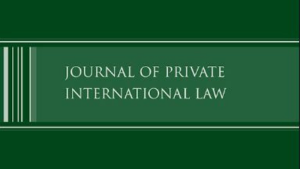Views
Trending Topics in German PIL 2024 (Part 1 – Illegal Gambling and “Volkswagen”)
At the end of each year I publish an article (in German) about the Conflict of Laws developments in Germany of the last twelve months, covering more or less the year 2024 and the last months of 2023. I thought it would be interesting for the readers of this blog to get an overview over those topics that seem to be most trending.
The article focuses on the following topics:
- Restitution of Money lost in Illegal Gambling
- Applicable Law in the Dieselgate litigation
- The (Non-)Valitidy of Online Marriages
- New German conflict-of-law rules regarding gender afiliation / identity
- Reforms in international name law
I will start in this post with the two first areas that are mainly dealing with questions of Rome I and Rome II while in my follow-up post I will focus on the three areas that are not harmonized by EU law (yet) and are mainly questions of family law.
Chinese Judicial Practice on Asymmetric Choice of Court Agreements in International Civil & Commercial Disputes
By Yuchen Li, a PhD student at Wuhan University.
A. Introduction
An asymmetric choice of court agreement is commonly used in international commercial transactions, especially in financial agreements, which usually allows one party (option holder) an optional choice about the forum in which proceedings may be brought but the other (non-option holder) an exclusive choice to sue in a designated court.[1] A typical example is as follows:
‘(A) The courts of England have exclusive jurisdiction to settle any disputes ….
(B) The Parties agree that the courts of England are the most appropriate and convenient courts … to settle Disputes and accordingly no Party will argue to the contrary.
(C) This Clause is for the benefit of the Finance Parties only. As a result, no Finance Party shall be prevented from taking proceedings relating to a Dispute in any other courts with jurisdiction. To the extent allowed by law, the Finance Parties may take concurrent proceedings in any number of jurisdictions.’ [2]
In recent years, issues concerning asymmetric choice of court agreements have been controversial in cases within some jurisdictions.[3] Despite the significant amount of research on asymmetric choice of court agreements, little attention has been paid to Chinese stance on this topic. With Chinese private parties actively engaging in international transactions, Chinese attitude towards such clauses is important for commercial parties and academic researchers. This article gives a glimpse of how Chinese courts handle asymmetric choice of court agreements in international and commercial civil litigations.[4] Read more
China’s New Civil Procedure Law and the Hague Choice of Court Convention: One Step Forward, Two Steps Back?
By Sophia Tang, Wuhan University
China’s New Civil Procedure Law adopted in 2023 and taking effect from 1 Jan 2024 introduces significant changes to the previous civil procedure law regarding cross-border litigation. One of the key changes pertains to choice of court agreements. In the past, Chinese law on choice of court agreements has been criticized for being outdated and inconsistent with international common practice, particularly because it requires choice of court clauses to be in writing and mandates that the chosen court must have “practical connections” with the dispute. After China signed the Hague Choice of Court Convention, there was hope that China might reform its domestic law to align with the Hague Convention’s terms and eventually ratify the Convention.
The New Civil Procedure Law retains the old provision on choice of court agreements, stating that parties can choose a court with practical connections to the dispute in writing (Article 35). This provision is included in the chapter dealing with jurisdiction in domestic cases, but traditionally, Chinese courts have applied the same requirements to choice of court clauses in cross-border cases.
News
Call for Chapters: Digitalisation of Justice
Dr. Benedikt Schmitz (University of Groningen), the editor of an upcoming edited volume called ‘Digitalisation of Justice: Perspectives from Germany and the Netherlands’, has kindly shared this Call for Chapters with us. The volume will be published by Springer.

Call for Abstracts for Emerging Scholars: Digitalisation of Justice, University of Groningen, 29 May 2026
Dr. Benedikt Schmitz (University of Groningen), the organiser of the upcoming symposium ‘Digitalisation of Justice: Perspectives from Germany and the Netherlands’, has kindly shared this Call for Abstracts for emerging scholars with us.

Save the date: 11th Journal of Private International Law Conference, 1–3 April 2027 in Zurich
With the 10th Journal of Private International Law Conference successfully concluded, preparations for the next, 11th Journal of Private International Law Conference in Zurich are already underway. 
Please save the date: 1–3 April 2027.
The conference organizers Tanja Domej (University of Zurich) and Christiane von Bary (University of Zurich), and the editors of the Journal, Paul Beaumont (University of Stirling) and Jonathan Harris (King’s College London), are looking forward to welcoming you in Switzerland!


